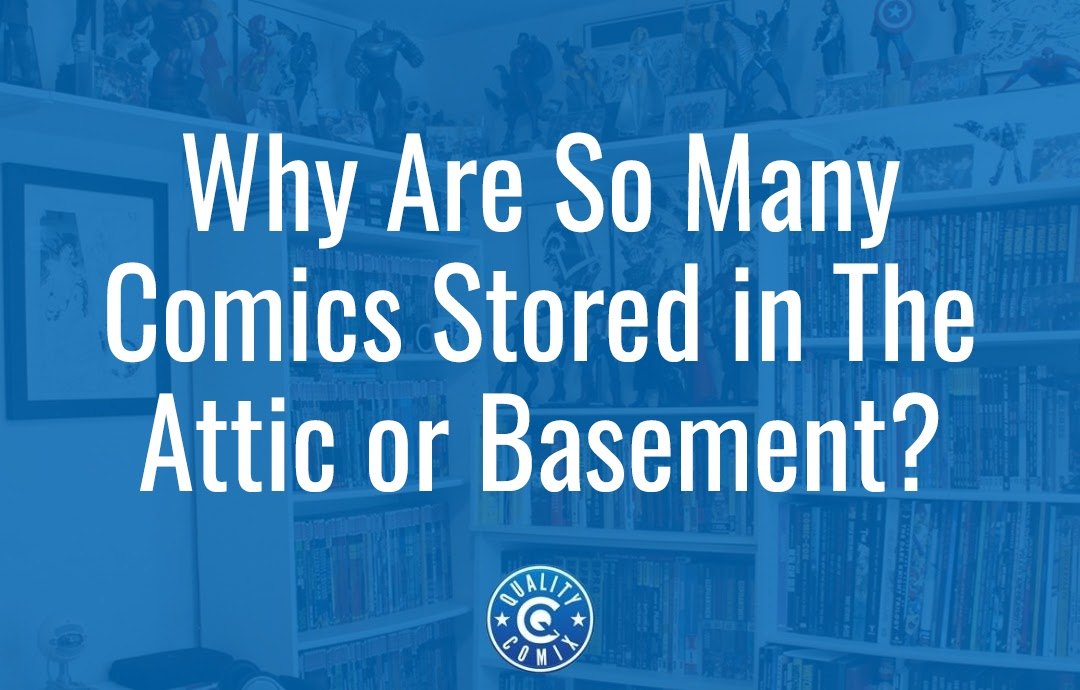
How many times do you catch a viral news story about someone finding comics from their father or grandfather, stashed away in an out-of-the-way corner of the basement or up behind the Christmas decorations in the attic, and appraises the collection as extremely valuable? It seems to happen time and again.
- In 2009, a collection estimated to be worth half a million was found in a basement.
- In 2023, a collection found in a basement sold for $3.5 million and included Batman #1, Action Comics #1, and Detective Comics #27 (Batman's first appearance.)
- In 2007, a Denver resident found a copy of Detective Comics #27 in their attic.
- A certified Pedigree Collection, the Promise Collection, spent decades in an attic.
What's the deal? Why are so many comics stored in attics and basements?
Table of Contents
First, the Why
Why are comics so often found in attics and basements? Well, the simple answer is: it's space to store stuff.
That's pretty much all there is to it, really.
When you have a house, you have to keep your stuff somewhere. When the stuff you need to store somewhere no longer has a place on a shelf, isn't in active use, or is being set aside to one day sell or give away or donate to charity, that stuff ends up packed away in boxes and stored anywhere it can be stored.
Sometimes, that's a closet. Sometimes, it's in the back corner of a basement, guarded by decades of spiders and cobwebs. Sometimes, it's up in the attic, where the risk of insects and rodents is relatively obvious and preventable. Sometimes, it just ends up in boxes stacked in a spare room, under furniture, or stashed on shelves.
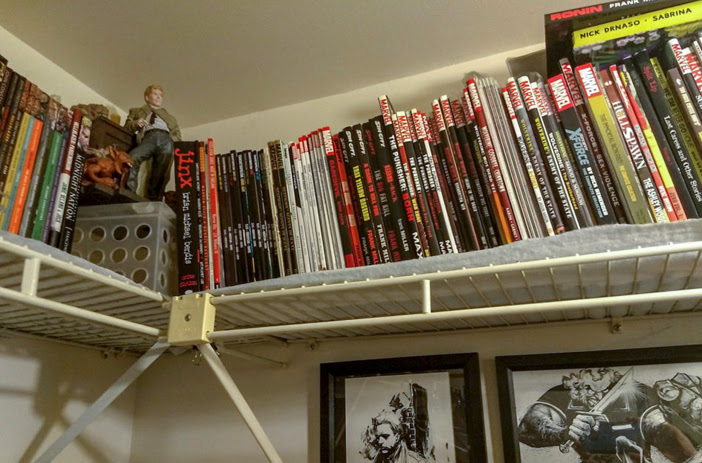
Why are so many valuable comics found in attics and basements? Consider that these are the "final resting places" for assorted household stuff. When it's not in active use, it goes on a shelf. When the shelf needs to be cleared off, it goes in a box. When the box needs to be moved, it goes into a closet. When the closet needs to be cleared out, it goes to the basement. When the basement needs to be shuffled, it makes its way further back, behind other, more frequently used stuff.
Sometimes, this process takes years or even decades. It's not uncommon for a child to read some comics, put them away, and they get packed up. The child grows up, moves on, goes to college, moves on with their lives, and eventually, their parents need to shuffle things. Maybe they're moving, selling their house, or downsizing. Maybe they're old enough to need hospice care, and their home needs to be cleared out and sold. Maybe one or both have passed away, and it's time to sort through their belongings and hold an estate sale.
Are Comics Found in Attics and Basements More Frequently?
Well, yes and no.
It's not like anyone has a complete survey of where comics are stored, right?
We hear about comics collections found in basements and attics because it's common enough from people who don't know any better about storing comics or even that they have any value at all. And there are, occasionally, stories about valuable collections found in closets too. And sometimes they're found in storage units, or hidden behind shelves, or in secret panels under floorboards where a child hid their treasures. They're everywhere, really.
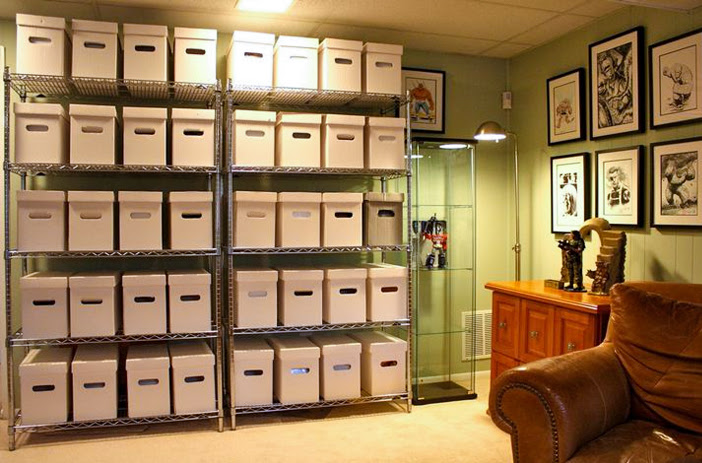
There's also selection bias. People who find collections in attics and basements do so because the people who own those attics or basements don't know how to store comics properly or what those comics are worth.
In fact, if you know what comics are worth and how they should be stored, you wouldn't keep them in the attic, and you might not keep them in the basement. That doesn't mean you'd keep them on display, of course; it's just that you might recognize the issues with storing them in those locations.
Why the Attic is a Terrible Place for Comics
Attics are, hands-down, perhaps the worst place in a home you could store comics. Maybe if you stored them in your bathroom, it would be worse, but even then, maybe not by as much as you might think.
Attics are generally pretty terrible for comics because they have almost everything that comics hate.
First of all, heat. Heat fosters mold and mildew growth, and can accelerate the degradation of the paper the comics were printed on. More acids leach out of the paper and eat away at the inks and the paper itself. Very carefully applied heat can be used to help fix comics – it's part of what pressing is – but uncontrolled heat in storage is a terrible idea.
Secondly, moisture. Attics should be ventilated, as they're part of a house's system, but we all know the average house is constructed terribly, and it's very easy for soffits to get blocked, insulation to cover ventilation, or even ventilation to not be properly installed in the first place. And moisture is the only thing that can ruin comics faster than heat.
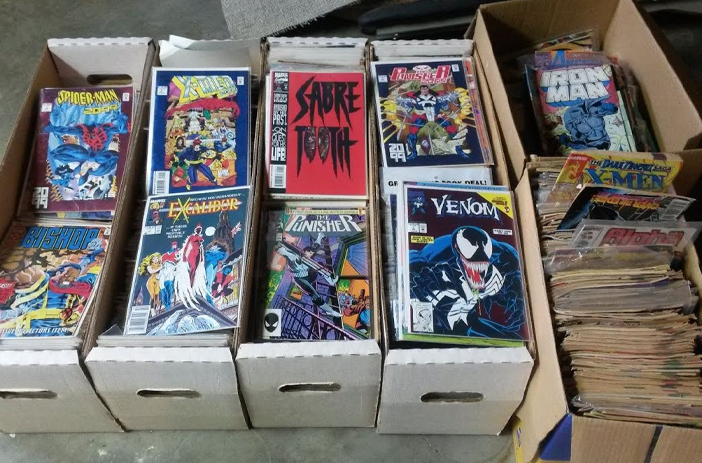
Attics are also relatively unattended spaces in a house, with easier access from the outside than other parts of the house. If a squirrel, raccoon, or other animal is going to get into part of the house, it's probably going to be the attic. Animals don't care about your property. They'll dig into insulation, wires, boxes, paperwork, clothing, anything they feel like tearing up. They'll dig into them to make their nests, they'll stash their stored food in them, and they'll pee on them. More than a few people have pushed their way into their attics for the first time in years, only to find everything in it virtually destroyed by critters.
If the animals weren't enough, the food and debris they bring in with them also brings in insects, and those insects can cause damage too.
Attics are also uniquely vulnerable to potential damage. If you live in an area with high winds and strong winters, trees and branches can fall, roofs can be damaged or even ripped off, and the attic is the first part of the home exposed to the elements. Even a minor failure of a shingle or two can lead to a slow water leak that can ruin a box of comics before it seeps through to the rooms below and becomes noticeable.
One has to wonder how many copies of incredibly valuable and classic comics have been lost to the ravages of time and weather because they were stored in an attic. The collections recovered from attics are often in poor condition, too; you see grades in the 5s and 6s at best, not the 8s or 9s.
Why the Basement is a Bad Place for Comics
When you're told to store something somewhere safe, what are the words that come to mind first? Probably something like "a cool, dry place."
This is because, as mentioned, heat and moisture are the enemies of just about everything. Heat fosters the growth and decay of materials and organisms. Moisture feeds those organisms. Everything from bacteria to mold to fungi grows in those conditions.
So, what's the opposite of an attic? A basement! You'd think that means the basement is a good place to keep comics.
This can be true, but it might not, and it depends entirely on the condition of your basement.
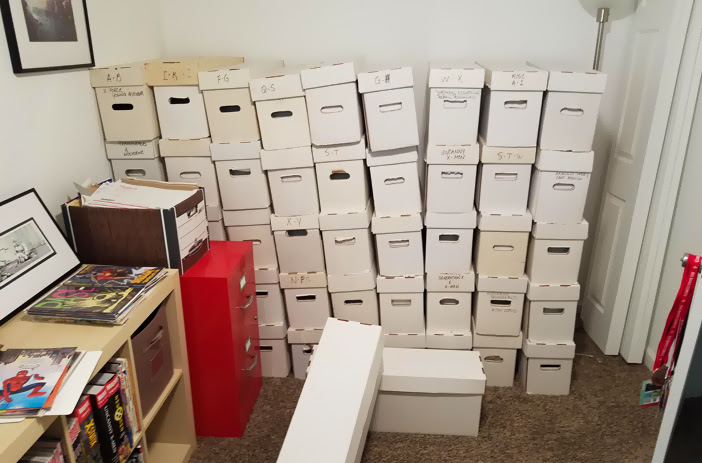
If you live in a place where unfinished basements are common, your picture of a basement is likely to include packed dirt or cement floors with cracks and stains, rough walls of stone or brick likely sealed and painted more than once, maybe a crawlspace full of decades of spiders you don't even want to think about looking into, piles of mysterious dirt that erode from the foundation, and more.
On the other hand, if you live somewhere where unfinished basements are a rarity, a basement to you is like any other room, just underground, often where it's cooler. It doesn't have much in the way of windows; it might even have carpet, and it could be a pretty comfortable spot to hang out. "Man cave" isn't an unfair descriptor for many of these kinds of basements, either.
It's probably pretty obvious which one of these is better for comics.
Unfinished basements aren't protected from the elements, and while hopefully, your home isn't flooding regularly, water seeks the lowest point, and that means if it's flooding outside, it might be flooding inside. Water can seep up from the ground, infiltrate through walls, and even something like a burst pipe can have worse consequences for the basement than any other room in the home.
And, of course, there's also the possibility of something digging into your foundation and getting into your storage spaces. Without being properly sealed, you never know if a local groundhog or skunk or something else might dig a hole, break through, and have a field day. Even mice can end up poking their heads in where you don't want them.
Basements can be a fine place to store comics. Finished basements, especially if you live somewhere where the chances of flooding are nil and the biggest risk comes from your plumbing, are probably fine. Certainly better than a storage unit, a windowsill, or the attic, that's for sure.
How to Properly Store Comics
If you have vintage comics and you want to know how to store them properly, the first thing to do is probably to get them graded. Pretty much anything from the golden age can be worth at least a couple hundred bucks and is worth getting placed in a slab for the best protection possible. Even if you don't want to go that route, though, at a minimum, you want a good bag and board, preferably stored in a conventional comics long box for the right form factor. You don't want them sliding around and bending or creasing, after all.
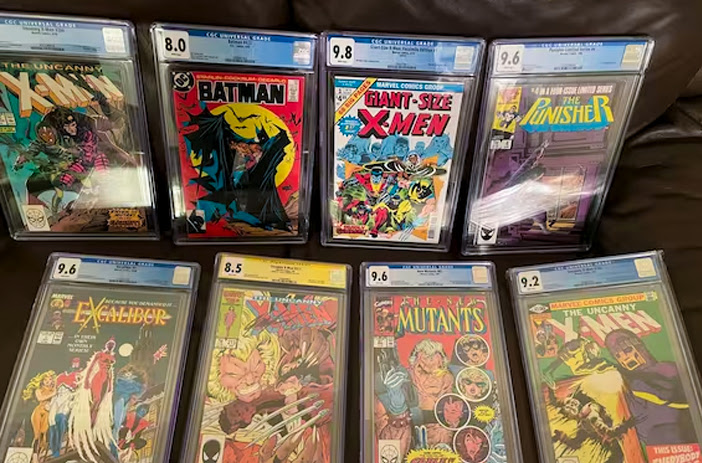
From there, it's just a matter of keeping them somewhere cool, dry, and away from possible dangers. Heat and moisture are the enemies of comics, so definitely keep them out of the attic. The basement can be fine, or a closet is good, as long as they're out of direct sunlight. You might also consider thinking about the infrastructure of the home. Don't store comics in a closet that shares a wall with an active fireplace or furnace. Keep them away from a water heater that might purge if it's damaged or fails or pipes that could burst if they get clogged, freeze, or corrode too much.
If you want to go into this in greater detail, you're in luck; we have a whole post just on properly storing comics here.
Looking for Treasure? Where to Seek Old Comics
If you're hoping to find vintage comics and strike it rich, there's a pretty good chance you're going to strike out. It happens from time to time, but when you consider that there are tens of millions of people (at least) who are aware of and keeping an eye out for valuable comics, plenty of places are already picked over.
If you're hoping to find gold in the stacks, basements and attics aren't a bad choice to look at. Specifically, though, consider looking through estate sales and similar late-life collections, particularly of people who may have had young children in the 30s and 40s. Digging around in the attic of a house that wasn't even built until 1990 probably isn't going to get you much, after all.
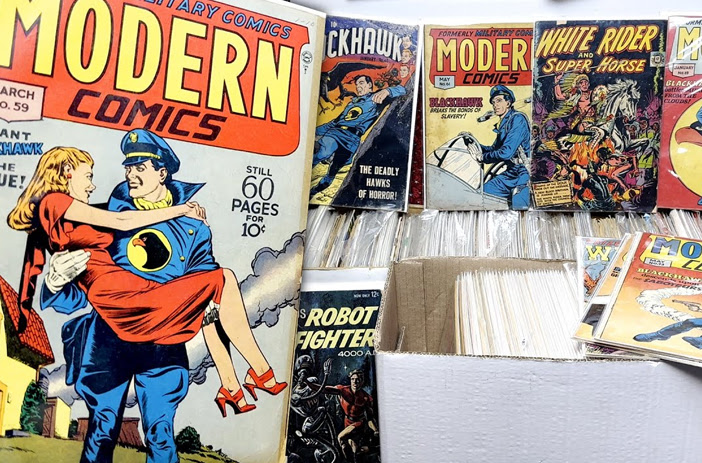
Of course, the more sure-fire way to find old comics is to check out our store. As the biggest and best dealer in valuable old comics, we always have new vintage books in stock for you to check out.
And hey, if you ever do find a vintage collection, and you want to know what they're worth, we're more than happy to help. Just fill out the contact form on this page for a free, no-obligation review of what you have and what it might be worth. Maybe you struck it rich after all?



